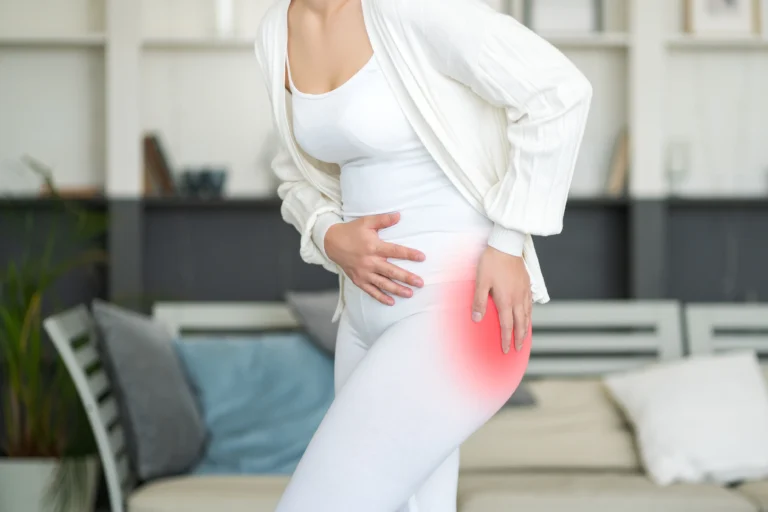What To Do If Your Hip Hurts And You Can’t Walk
Immediate Actions To Take
If you experience sudden hip pain without injury and find yourself unable to walk, it’s crucial to address the issue immediately. Start by finding a comfortable sitting or lying position that relieves pressure on your hip. Applying an ice pack can help reduce initial inflammation and numb the pain. Use a pillow to relieve hip pain while sleeping, supporting your hip by keeping it at rest. Avoid any abrupt movements during this period.
Book your appointment today at Bull City PT’s Durham – Charlotte – Brier Creek offices.
Rest And Temporary Modifications
The importance of rest cannot be overstated in managing severe hip pain. Avoid any weight-bearing activities and modify your daily routine to allow your hip time to recover. Gentle stretching might be beneficial to maintain some flexibility, but it should not exacerbate the pain. If mobility is severely restricted, assistive devices like crutches can be helpful to prevent further strain on the hip.
Contacting A Healthcare Professional For Diagnosis
If the pain persists or is accompanied by other symptoms such as swelling or fever, it’s essential to contact a healthcare professional. A qualified clinician can conduct a detailed diagnosis of the cause of your hip pain, often starting with a physical examination and possibly recommending imaging tests like X-rays or MRIs. Early diagnosis and intervention are key in preventing more serious complications and assisting in a tailored treatment plan, which may include physical therapy or other interventions.
Can You Live With A Bad Hip?
Lifestyle Adjustments For Coping With Hip Pain
Living with a bad hip requires making lifestyle adjustments to minimize discomfort and maintain mobility. Simple changes such as incorporating ergonomic furniture, avoiding prolonged sitting, and engaging in low-impact activities can help manage hip pain. Additionally, losing weight if necessary can reduce the stress on the hips and alleviate pain.
Role Of Physical Therapy And Exercise
Physical therapy plays a crucial role in managing hip pain in a woman as well as in men. With targeted exercises, physical therapists at Bull City PT can help strengthen the muscles around the hip, improve flexibility, and enhance mobility. Consistent therapy sessions followed by prescribed at-home exercises can significantly aid in relieving hip and leg pain.
Support Systems And Resources Available
For those struggling with ongoing hip issues, having a support system is invaluable. Connecting with support groups, both online and offline, can provide emotional reassurance. Additionally, Bull City PT offers comprehensive resources including educational materials and personalized care plans to help individuals navigate life with a bad hip.
What Painkillers Are Good For Hip Pain?
Over-The-Counter Pain Relief Options
When dealing with hip pain, the initial step often involves over-the-counter (OTC) medications. Common choices include acetaminophen and nonsteroidal anti-inflammatory drugs (NSAIDs) like ibuprofen or naproxen. These medications can be effective in decreasing pain and reducing inflammation, providing temporary relief for mild to moderate hip pain. It’s crucial to use these drugs as directed and consult with a healthcare provider if you have any pre-existing conditions or are taking other medications.
Prescription Medications
For more severe hip pain, healthcare professionals may prescribe stronger medications. Options include prescription-strength NSAIDs or other pain relievers such as opioids. In specific cases, corticosteroids may be prescribed, either orally or via injection, to reduce severe inflammation in the joint. It’s important to have a conversation with your healthcare provider to understand the use, duration, and potential side effects of these medications.
Potential Side Effects And Considerations
While effective, painkillers can come with side effects. Common issues with NSAIDs include gastrointestinal discomfort or increased risk of cardiovascular events with long-term use. Opioids, while effective for severe pain, carry the risk of dependency and other side effects such as drowsiness and constipation. It’s essential to weigh these factors and follow your provider’s guidance when using these medications to manage hip pain.
Why Is My Hip Pain Getting Worse?
Experiencing worsening hip pain can be distressing and disruptive to daily activities. Understanding the reasons behind this escalation in pain can aid in identifying the appropriate treatment strategies. Worsening hip pain can result from various causes of hip pain, including overuse, underlying chronic conditions, or even lifestyle factors.
Common Causes Of Worsening Hip Pain
One of the most frequent causes of increased discomfort in the right hip area, or any area of the hip, is overuse. Activities that involve excessive repetitive movements can place undue stress on the hip joints and surrounding musculature. Additionally, exacerbation of underlying conditions such as arthritis, bursitis, or tendonitis may contribute to worsening symptoms. Trauma or injury, whether minor or severe, also plays a substantial role. Significant weight gain can add pressure to the hip joints, leading to greater discomfort.
Importance Of Monitoring Symptoms
Engaging actively in monitoring symptoms allows for the timely identification of changes in pain levels, intensity, and frequency. Keeping a journal to log activities that potentially trigger pain, documenting pain ratings, and noting any additional symptoms such as swelling or limited mobility can provide useful data for assessing one’s condition. Understanding triggers and patterns are crucial for determining the fastest way to relieve hip pain and for adapting lifestyle choices that might mitigate ongoing pain.
Seeking Timely Medical Evaluation
When hip pain persists or intensifies, seeking evaluation from a healthcare professional is imperative. A timely medical evaluation can uncover underlying issues that may require specific interventions, such as physical therapy, medication adjustments, or lifestyle changes. Early intervention often leads to more successful outcomes and can prevent further deterioration of joint health and overall mobility.
Tackle hip pain efficiently by choosing Bull City PT. Our expertly crafted care plans and cutting-edge therapeutic approaches are designed to cater to your unique needs, ensuring swift recovery and heightened well-being. Schedule your consultation at Bull City PT today and embark on a transformative journey toward better health.







